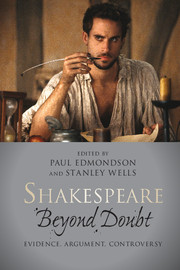Book contents
- Frontmatter
- Content
- List of illustrations
- List of contributors
- General introduction
- Part I Sceptics
- Part II Shakespeare as author
- 6 Theorizing Shakespeare's authorship
- 7 Allusions to Shakespeare to 1642
- 8 Shakespeare as collaborator
- 9 Authorship and the evidence of stylometrics
- 10 What does textual evidence reveal about the author?
- 11 Shakespeare and Warwickshire
- 12 Shakespeare and school
- 13 Shakespeare tells lies
- Part III A cultural phenomenon: Did Shakespeare write Shakespeare?
- Afterword
- A selected reading list
- Notes
- Index
11 - Shakespeare and Warwickshire
from Part II - Shakespeare as author
Published online by Cambridge University Press: 05 April 2013
- Frontmatter
- Content
- List of illustrations
- List of contributors
- General introduction
- Part I Sceptics
- Part II Shakespeare as author
- 6 Theorizing Shakespeare's authorship
- 7 Allusions to Shakespeare to 1642
- 8 Shakespeare as collaborator
- 9 Authorship and the evidence of stylometrics
- 10 What does textual evidence reveal about the author?
- 11 Shakespeare and Warwickshire
- 12 Shakespeare and school
- 13 Shakespeare tells lies
- Part III A cultural phenomenon: Did Shakespeare write Shakespeare?
- Afterword
- A selected reading list
- Notes
- Index
Summary
Ever since some people began openly to question William Shakespeare's authorship in the mid-nineteenth century, attacks on Stratford-upon-Avon have been a common anti-Shakespearian theme. For example, Ignatius Donnelly wrote in his 1888 pro-Baconian book The Great Cryptogram that ‘the lives of the people [of Stratford] were coarse, barren, and filthy’, and that ‘the people of Stratford were densely ignorant’. J. Thomas Looney similarly wrote in his Oxfordian tome ‘Shakespeare’ Identified (1920) that ‘dirt and ignorance…were outstanding features of the social life of Stratford in those days and had stamped themselves very definitely upon the family life under which William Shakspere was reared’. More recent anti-Shakespearians are usually not quite so blunt, but they typically present a bleak picture of sixteenth-century Stratford, and lament an alleged lack of correspondence between ‘the mundane, wholly uninspiring record of the Stratford man's life’ (as the Oxfordian Charlton Ogburn Jr. put it) and the great works of Shakespeare.
As with so much else that anti-Shakespearians write, such claims are based on distortions and ignorance of historical context. It's true that a time-travelling visitor from the twenty-first century would probably not find sixteenth-century Stratford to be very clean or progressive, but in the context of English society at that time, it was a prosperous market town with a fairly educated populace. Despite the picture painted by anti-Shakespearians, books were relatively common in Stratford, and middle-class people such as Shakespeare were typically literate in both English and Latin. William Shakespeare's friends in and around Stratford were a rather cultured bunch with numerous literary ties, not the ignorant dolts one might expect from reading anti-Shakespearians. Shakespeare's works are peppered with signs that the author came from the area around Stratford, which was famous from the 1620s onward as the home of the poet and playwright William Shakespeare.
- Type
- Chapter
- Information
- Shakespeare beyond DoubtEvidence, Argument, Controversy, pp. 121 - 132Publisher: Cambridge University PressPrint publication year: 2013



